This is documentation of a historical action taken to protect the sacred birthing trees.
What is happening on Djab Wurrung country, with the birthing trees and how do I help?
Firstly, to be clear, we are not a First Nations run group. We are an organisation that works in solidarity to train, resource, mentor and support all people across the many Aboriginal nations on this continent who are engaging in civil resistance – civil disobedience and non-violent direct action – to protect country and culture, and stand for social and racial justice.
One of the ways we can do that is to gather up resources to make them easily available and amplify the voices of mob on the ground when they are busy with acts of resistance.
LATEST NEWS – As of 27/3/19 Main Roads have agreed to halt proceedings until the next Federal Court hearing regarding Aboriginal Heritage in mid April. People are still needed on country.
HERE ARE SUGGESTIONS – directly from camp as of 20th March 2019
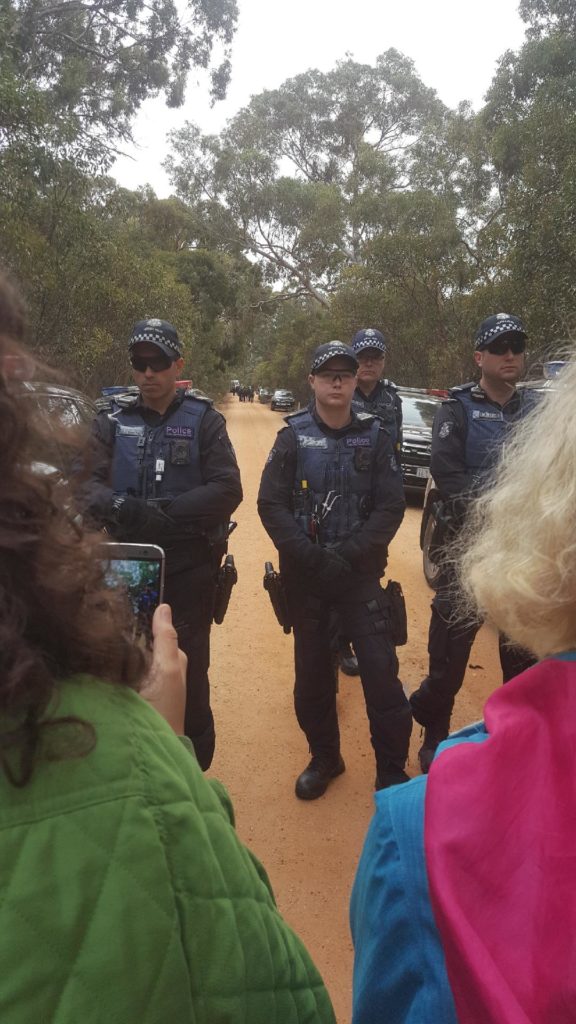
We’ve mapped out some other information below as well.
HOW TO HELP
- Bodies on the ground is most needed. See below for tips and directions.
- Please donate. This is the easiest way to help, if you can’t be there, on top of applying political pressure. This is the authorised crowd-funder. Money is spent on covering travel, food, petrol for core camp folk, gear for camp, plus basic accommodation for elders as required. Some very brave and staunch people made it through a cold winter at camp and these funds helped cover some basic costs.
- Political Pressure – Phone calls are best. They count the most and MP’s will track how many they are getting on any issue. You should call the decision makers on the list, as well as your local MP’s if they are Labor. You should also hit them up on facebook and twitter, and email them. Do ALL the things. This info sheet from camp gives key details.
- If using twitter use the hashtag #NoTreesNoTreaty and people also seem to be commonly using both #DjabWurrung and #DjapWurrung (in local language the letters sound the same) … follow and boost these discussions
- Share recent media
- NITV
- Channel Nine
- Croakey
- Ararat Advertiser
- SBS
But I called and they said they have done the right thing? First Nations leaders in the campaign are examining all types of interventions. From Federal court injunctions to meeting with state MP’s. The main issue is that just two trees is not good enough and that works need to be stopped until a resolution is found. There are also people on site which is an OH&S issue. There are people camped in and near the trees. No one should be moving machinery onto country.
The politicians say they have listened and found a solution. They are slightly moving the road to accommodate two trees. It seems to us a bit like driving a highway through the middle of a cathedral and a birthing ward. The issue is more than two trees. There are many more, an entire cultural landscape and extremely important sacred sites, and birthing trees still at risk.
The mob on ground are asking why should anyone think this government is serious about a treaty process whilst they are trashing culture?
Where do I find out more about the issue? You can go to the DJAB WURRUNG embassy website and facebook page. The most recent galvanisation of people to the site happened on the 19th March when a red alert was issued to supporters and 100 people mobilised within 24 hours to the site.
Images from embassy
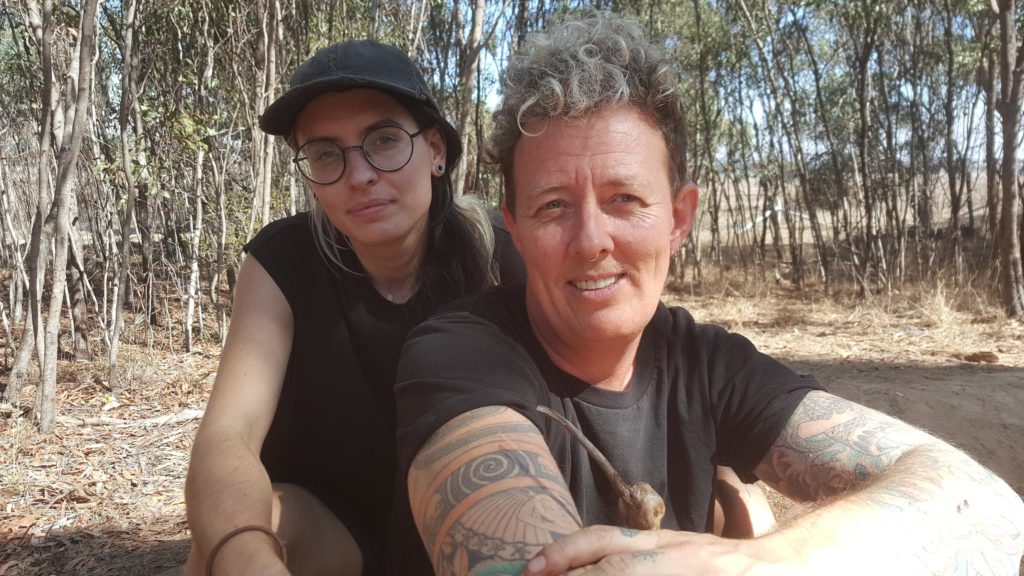
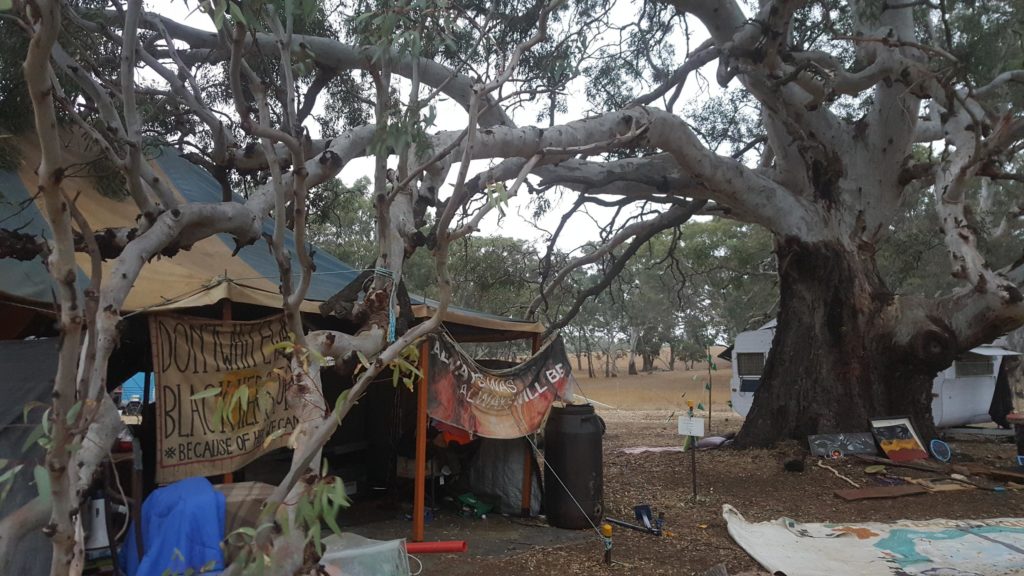
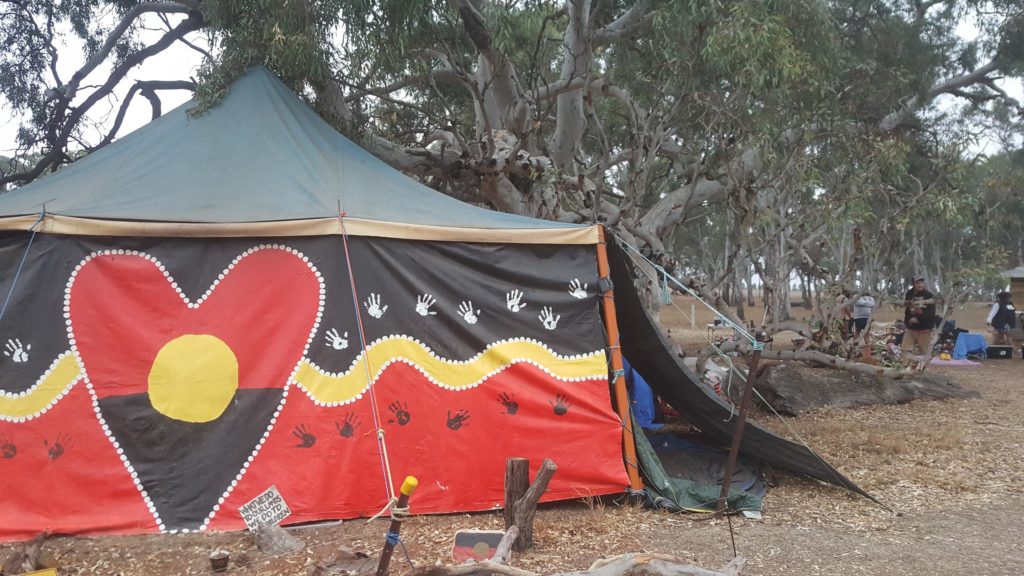
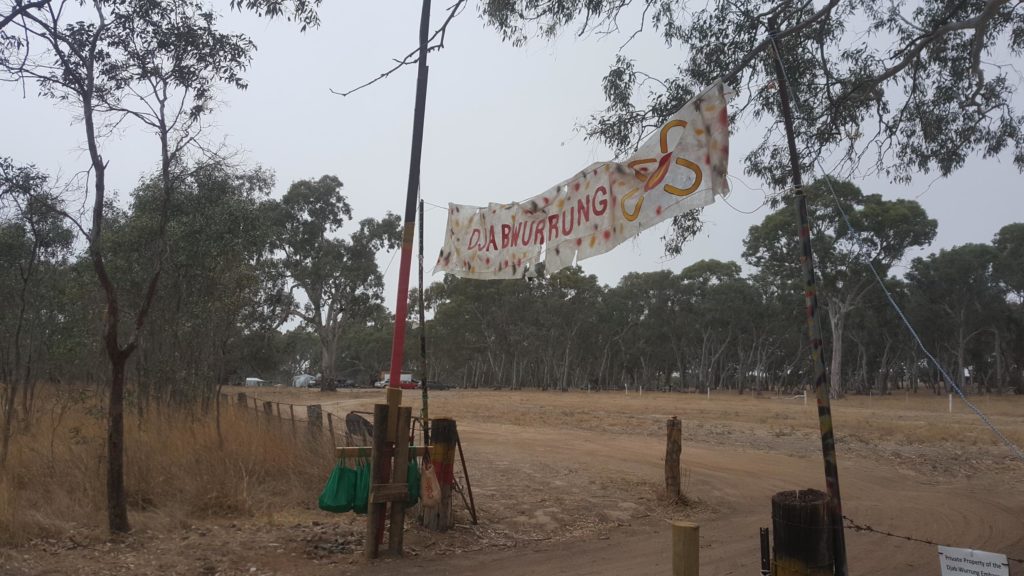
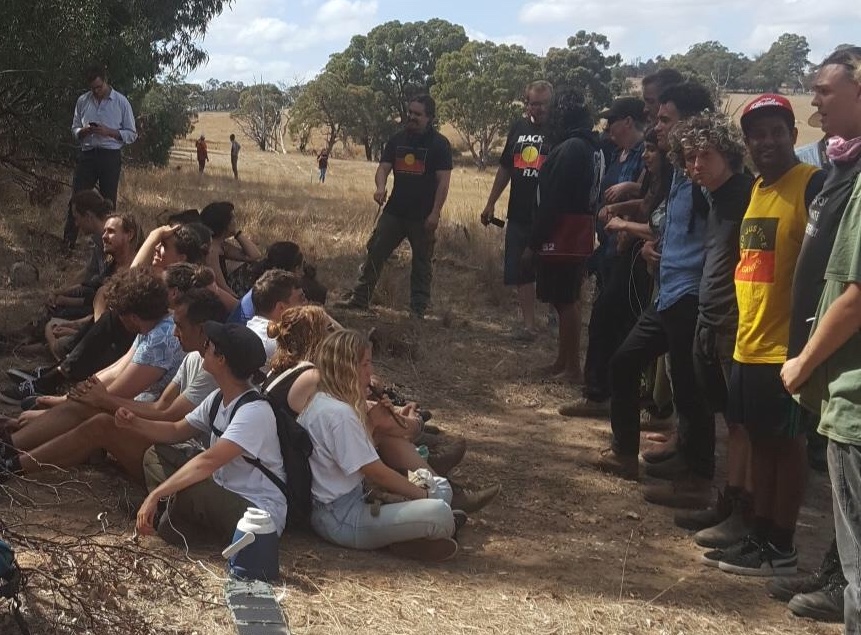
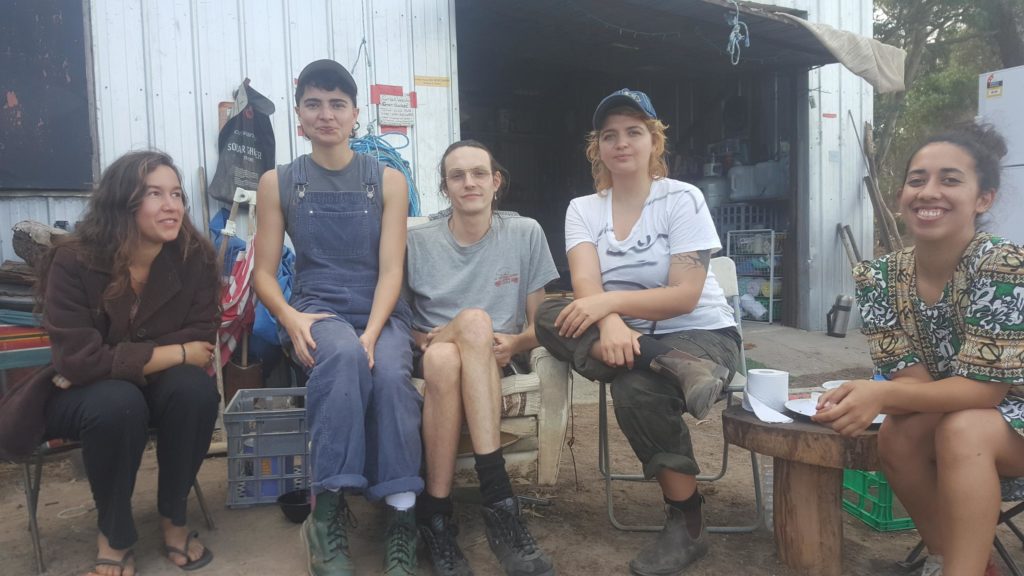
Staunch presence and broad scale support and political pressure led to police literally having to back out of country with their vehicles, escorted out by traditional custodians. Powerful footage of the eviction is here. There is a great video from another supporter here. Since then there have been statements of solidarity from the Federation of Community Legal Centres, the Nurses Union and a range of organisations.
Tarneen Onus Williams wrote a powerful piece in the Saturday paper giving context to the issue some months ago.
I’VE NEVER BEEN TO A CAMP – SHOULD I GO?
Hell yes! It will be an experience like no other. Be prepared for things to be a bit hectic, but if you just follow the lead of mob on the ground, and act to support, not overshadow their voices, this is a great start. You will find it empowering, and you will learn heaps. Its an honour to be invited onto country to help protect cultural heritage. It doesn’t happen often.
“We’re here to stand along the Djab Wurrung people to fight against ongoing genocide. As a settler and as a beneficiary of colonisation it’s my responsibility” ~ Maddi
But what do I do, what do I bring? If you aren’t sure what to bring, think whatever you would take camping, plus a few more practical items. Head torches are super handy. Weather appropriate gear. Charged phones and back up phone chargers and batteries are incredibly helpful, as well as cords to charge in your car, or an inverter to charge power cords/laptops.
We don’t know what the capacity for camp is to self-cater as the numbers grow, but normally where possible, communal meals are provided at camps like this. Maybe bring some back up supplies for yourself just in case.
A lot of people feel nervous doing something like this for the first time, so here is a handy tip sheet for going to a blockade.
But what about the cops? I don’t want to go to jail.
People almost never end up in jail for a peaceful civil disobedience offences. Aboriginal people are certainly at higher risk at being jailed for non-violent offences due to our unfortunately racist system, but there is legal support on offer for anyone wanting to participate.
We went and did a legal briefing there a while back. One thing that was raised and discussed is it is important to be aware of is that Aboriginal people are at much higher risk of police violence. Don’t act in any way that could increase this risk. Follow their lead. But also if an ally, consider using your privilege, weaponise your privilege if you are asked to step up.
People are being asked to be willing to be arrested if they are able, and if it comes down to a need to physically intervene to stop work. Whilst there are no guarantees what is likely is a simple, low level charge for civil disobedience, like trespass, or some kind of minor road obstruction charge – if, for example, you are technically on main roads land or a road way. (Even if you respect the sovereignty of first nations mob)
And no, it is not the end of the world, or your ability to travel, or get a job. We know plenty of fine upstanding citizens who have been arrested defending country. Also doctors and lawyers and scientists and 97 year old war veterans 😊 Read our frequently asked questions in this booklet which covers concerns.
Check out our round up of general legal resources and our Legal Handbook for activists in Victoria here (it says coal/gas resistance focused but its for everyone) and there is also this excellent Basic activist rights short overview.
What about legal support? Aboriginal people can try approaching the Victorian Aboriginal Legal Service, if they feel comfortable with that.
Otherwise, If anyone is arrested as part of this defence of country and culture – you should be able to find a pro bono (free) lawyer to assist.
Rob Stary’s legal firm often takes civil disobedience cases (24 hour number: 0407 410 821), and the Federation of Community legal centres recently tweeted offering support, and have a referral number – 1300 792 387, though this will be dependent on the individual CLC’s.
Fitzroy Legal Service is one that is often supportive of activists and has an excellent ACTIVIST RIGHTS website. You can also contact our friends at Melbourne Activist Legal Support who can also hopefully direct you to activist friendly lawyers, and both have excellent resources on legal support roles.
But I don’t know enough – not sure how I can help – should I still go?
Again, hell yes! Here are some skills and attributes that are useful at blockades
* Cooking * Photography * Community Liaison and friendly faces * Graphic designers * People who just get.shit.done * Parents and children * Childcarers * Community organising skills * Tree climbers * Support crew who hate climbing trees! * Videographer * Social media skills – all of em… insta/facebook/twitter * Geek extraordinaire * Toilet cleaner * General physical strength * Ppl with different physical and social abilities * People who can mediate and remain calm in the eye of the storm * Storytellers * Musicians * Writers * Project Managers * People with human resources experience * IT * People with EYES to look out * People who have worked as allies before to mob * First nations people * Legal knowledge * Website designers * Fundraisers * People who have never worked as allies before to mob but are willing to shut up and learn * People to make bloody good cups of teas for Aunties and Uncles * Drivers * Folk with logistics experience * Solar installers and electricians * Grey nomads with all the shizzle and comfy set ups * Dishwashers * People with union, organisational, political connections * Rope skills * People who have macguyver like skills to make shade out of two rubber bands, a tarp and a twig on a hot day and put up a tent in 60 seconds flat * People who want to know how to do that!
People who are willing to learn, willing to listen, willing to work, kind…
Get the drift? Basically that is you.
See you on the frontline.
FROM JUNE 2018 (earlier blog post that has been combined above)
Media – June 2018
A few weeks ago Aboriginal activists heard about sacred birthing trees slated for destruction by Vic Roads as part of a road works project near Ararat, regional Victoria – Djap Wurrung country.
They mobilised quickly, and the huge support and goodwill that has been generated from years of solid activism of the Warriors of Aboriginal resistance as well as well respected senior elders, backed up by allies, has seen hundreds of people activated, the trees saved from destruction for three weeks now, and is turning into a serious headache for Richard Wynne, Vic Roads, and the Andrews Labor government.
Leading activists in the campaign recently secured a meeting with Wynne, and are turning their sights on Luke Donnellan, the Roads Minister, who will need to negotiate
WHAT IS AT STAKE
We have dreaming sites and songlines that traverse through this landscape. Within the geographical region there are over 750 recorded cultural heritage sites, a third of which are scarred trees. The highway runs across the foot of Mt Langi Ghiran (Lar-nyi-djiran means ‘home of the black cockatoo’) which contains important stories and sites, including rock paintings. The sacred trees are living beings that embody our stories throughout the landscape. They are the guardians and protectors of this special area and are directly linked to our songlines, stories and heritage.
The trees have a high social and spiritual significance for Djab Wurrung people. Some of the trees are 700-800 years old. They are rare examples that have been modified through cultural practices of our ancestors hundreds of years ago. For countless generations, our ancestors have have had deep relationships with these trees, which play a critical role in looking after our people and country. Their health and safety is directly related to the wellbeing of our people and country. Their safety and protection is for the wellbeing of all people.
These trees are our ancestors, our ‘Tjukuritja’. To destroy them is to destroy a part of us. They warrant our protection like our grandmothers and grandfathers. It is our duty to protect them. Our old people mourn deeply at their destruction. It is our belief that their destruction causes great misfortune and sickness.
~ Djap Wurrung mob (taken directly from their website)
HOW DO I FIND OUT MORE
Follow their facebook page, also there are regular updates shared on a page managed by local residents. There has also been a long history of resistance to this project for many years and another local group was previously involved in actions such as locking themselves to trees to try and stop earlier clearing.
Past references
- Greens MP Adam Bandt spoke about the issue in Federal Parliament check it out here

